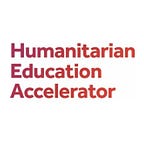Interview with Amos: M-Shule’s journey within the HEA Cohort
Written by the M-Shule Learning Team
Every learner deserves the right to quality education and to build their skills for future success. More than 150M learners have been impacted by COVID-19 related school closure and there has been a push to explore online learning. We sat down with Amos Otunga, M-Shule’s Learning and Projects Supervisor and a trained Kenyan teacher, to understand his journey within the Humanitarian Education Accelerator Rapid Response COVID-19 cohort.
Question: As an organisation, what informed M-Shule’s Decision to apply for the Edtech Hub Refugee Acceleration?
Amos: At M-Shule, we put the learners at the core of what we do. We believe that every individual, especially those from marginalised communities, should get equal and equitable access to quality education. We combine texting with artificial intelligence to deliver tailored, accessible, and affordable learning.
Our AI first assesses learners’ proficiency levels in a specific topic then creates a unique learner profile and delivers guided training sessions and assessments through SMS — harder content for advanced learners, or basic content if they’re just starting out. We can also collect data, surveys and assessments to track users’ progress.
Our drive is to reach learners in communities that are often forgotten. During the pandemic, we have seen low-income families drastically affected by school closures — and this divide has impacted refugee children most of all. They too deserve a chance to learn academically as well as enhance their socio-emotional development.
We believe our platform is uniquely positioned to support primary school learning, offering a low-tech solution for the most at-risk populations when learning has been disrupted at a global scale.
Question: How was the experience for you and the team while in the HEA Rapid Response Bootcamp?
Amos: It has been really amazing, not only to learn from a team of experts, but also getting to trade experiences with individuals from around the world. It was interesting to note what other organisations go through in the quest to provide educational solutions amid the corona virus situation.
Question: Were you able to learn from other organisations and mentors during the HEA Bootcamp?
Amos: Yes, indeed. I was very fascinated to see similarities and differences in what we do and what other organisations do even outside Kenya. During one breakout session, I got to better understand how language barriers come into play when interacting with users. For example, one organisation relied on community leaders to carry out translations as they were doing their experiments and testing due to the difference in dialects by the potential users. At M-Shule, we involve the whole learning community to identify what works for them and maximise on uptake.
We were also able to discuss our assumptions and preconceived ideas that could affect our projects. For example, one assumption that many people have about SMS is that providing huge chunks of information on a small screen can put off learners. However, I remember one organisation said that the peoples’ drive to learn and succeed in that case superseded the inconvenience of having to look at numerous pages of content on a feature phone. That is also what we have seen in our work.
Question: What are some of the solutions that you are looking for as an organisation?
Amos: Well, we’re the first learning platform to use SMS to build academic or life skills and collect data in a personalized way. We combine SMS with artificial intelligence to deliver tailored, accessible, and affordable learning that builds skills and knowledge.
We’re helpful to schools and parents because we are the only platform out there that helps them reach their students who are all offline, at a distance, in an impactful way even amid the COVID19 situation.
Question: Are there any significant lessons you learnt from the HEA bootcamp?
Amos: There were so many lessons but one of the most fundamental things that we learnt was communicating impact and the important role it plays — not only in building a strong narrative for international audiences, but also how it affects engaging with our various stakeholders. Additionally we saw that data is equally important in explaining an intervention to the audience — data should have a supporting role rather than being the main focus.
Question: Do you have any final remarks?
Amos: My team members and I were excited to be part of the process as it is through such forums that you can learn and grow together as an organisation. We are looking forward to the next 5 years where we aim to scale even further to improve knowledge, skills and incomes for 1 million learners particularly from refugee and marginalised populations.
